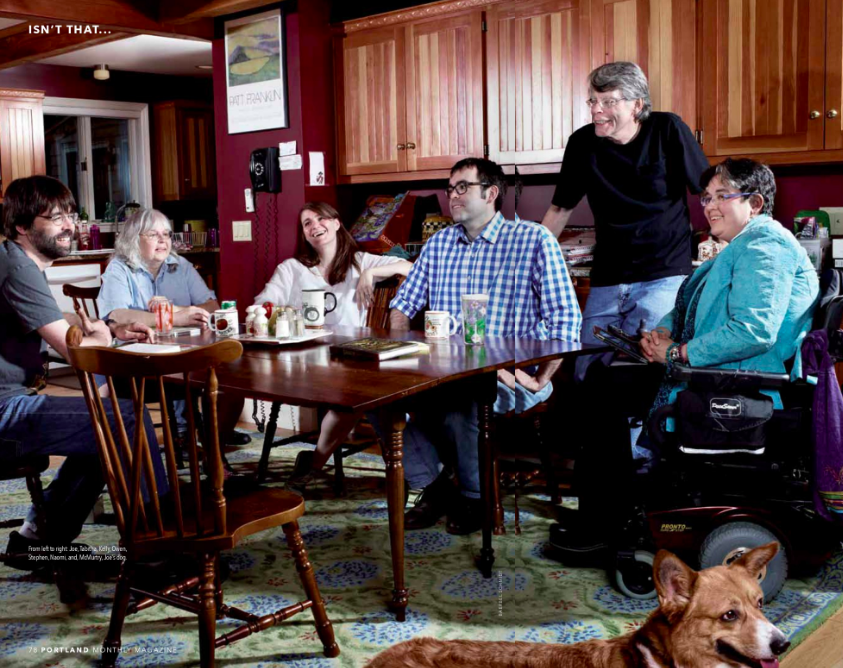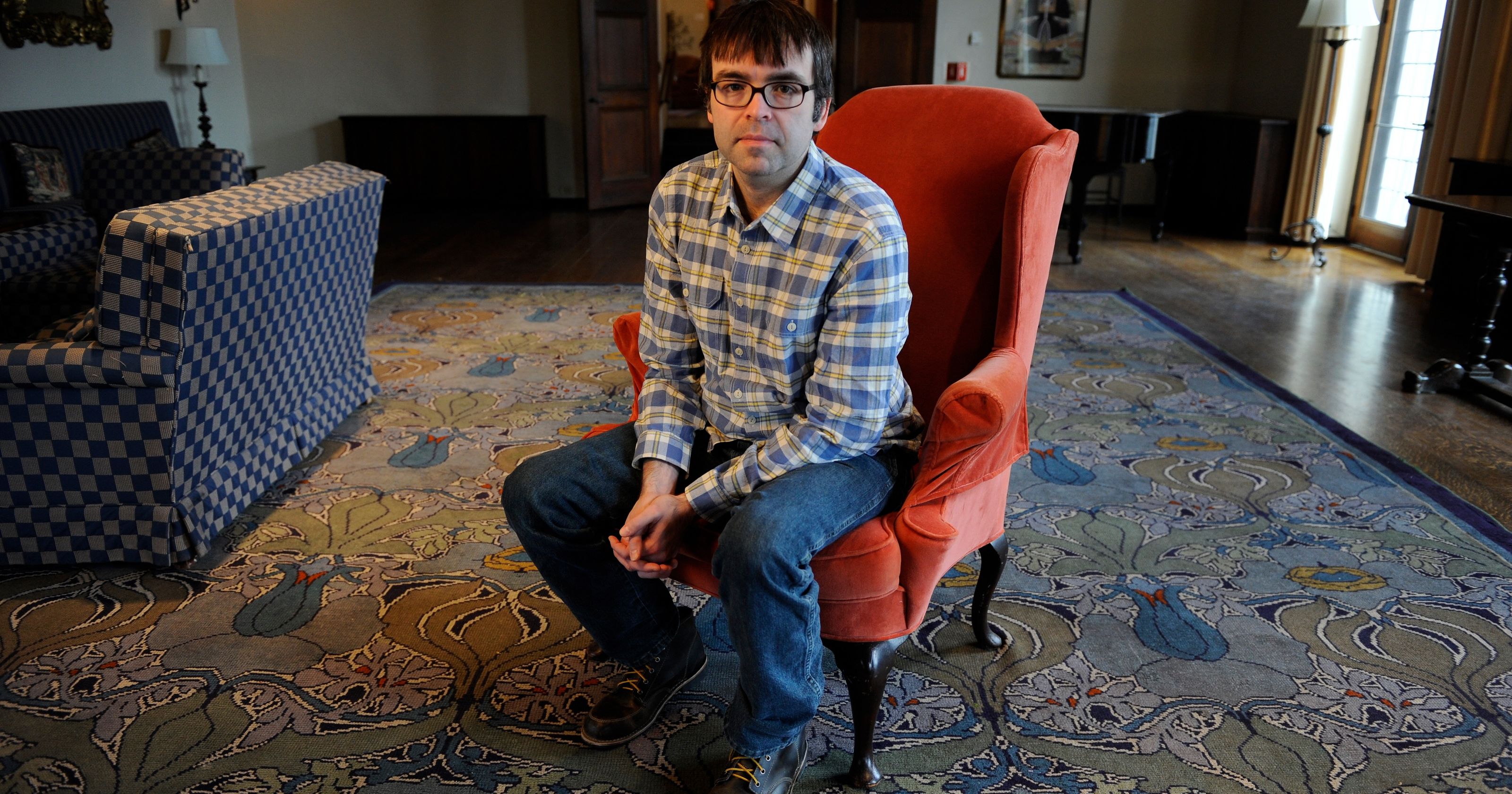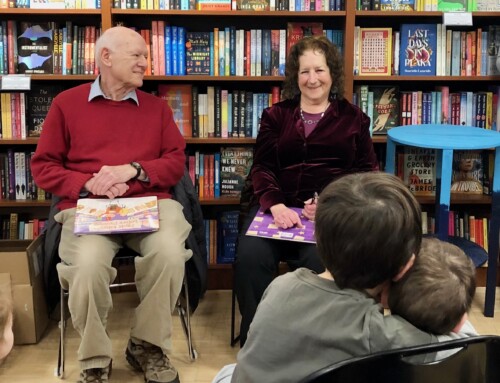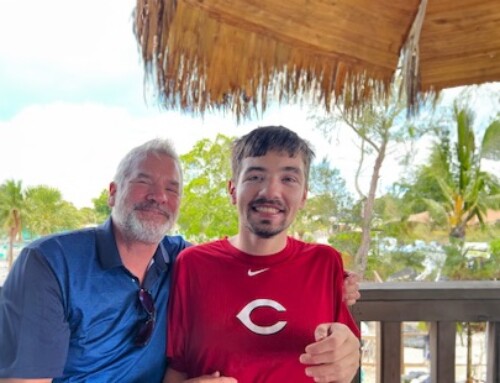Dad Stephen casts no shadow over new generations of Kings.
By Nina Livingstone
 At 47 West Broadway in Bangor, three children grew up in a Gothic mansion surrounded by a black
At 47 West Broadway in Bangor, three children grew up in a Gothic mansion surrounded by a black
wrought-iron fence decorated with spiders, bats, and three-headed reptiles.
Inside, Stephen and Tabitha King wrote novels while their kids experimented with their own stories. Two of the children—both boys—would go on to become award-winning novelists, and the eldest would take her writing talents to the pulpit and become a minister.
In The Beginning
As a fellow at the University of Maine, Tabitha immediately recognized her boyfriend’s gift, as she herself
was a writer with an editor’s eye. In 1967, Stephen sold a short story to Startling Mystery Stories—his
first professional sale. The two married in 1971 shortly after graduation. While working to keep a roof
over their heads and food on the table, they started a family, with Naomi their first born. When the novel
Carrie skyrocketed Stephen into the recognition that had eluded him, his career was on its trajectory.
“I was cognizant that our family was different,” Owen King, 41, the youngest sibling, says. “However, my
parents did everything they could to be regular members of the community. They were accessible. They
were present.
“Everyone knew my old man. He was always at the store, a game, or the movies wearing his old jeans and
his ball cap. He’s very approachable. That made a huge difference, so it was a little easier for me to fit in
than you might expect.
“[Bangor] made it possible for me to have a relatively normal childhood. I don’t know exactly how that
played into becoming a writer, but I’m grateful for it,” Owen says.
This grounded sense of self might explain Owen’s earlier works, which strikingly did not channel his
father’s love of horror, nor match Stephen’s prolific output.
“I worked so hard for so many years on Double Feature,” Owen says of his 2013 novel. “I came so close to
quitting on the book [before I was able] to get to the other side and to have it resemble what I’d originally
imagined.”
Owen’s hard work paid off. Double Feature drew resounding cheers, with David Thomas of the New York
Times Sunday Book Review venturing some constructive criticism. “The novel is maybe a third too long,
chiefly because as he wanders around King can hardly see a place, a face or a chair without embarking on
a wordy, if not literary, description of it.” Even so, Thomas finishes with a big thumbs up: “[Owen] should
persevere, for when he is good—and that is often enough to make a page-turner of this book—he has a
captivating energy, a precision and a fondness for people that are rare and that make the reader doubly
impatient for him to do what he does best.”
Owen did persevere, and in 2017 his epic novel Sleeping Beauties was published. Co-written with his
father, Sleeping Beauties woke up the critics. Xan Brooks of The Guardian credits Owen with revitalizing
his father’s work. “Maybe all [Stephen King] required was his son’s intervention,” Brooks writes.
For Owen, Sleeping Beauties has played a much different role. “I’m sure there are plenty of people who
won’t believe it, but neither of us went into the project thinking ‘we’re going to write a big bestseller.’ We wrote Sleeping Beauties because we had this idea that we were both excited to explore. We didn’t know if
it would work. We didn’t even know if we’d be able to finish, [or] if we’d be able to mesh styles and create
a shared voice that was coherent,” Owen says. “More than anything, I was excited about the opportunity
for us to spend the time together that we got to spend.”
The steep slope of collaborating with his father was not lost on Owen. “He was pretty successful already.
He didn’t need any help from me.”
But helping is a family tradition. It was Tabitha King who retrieved three wadded up sheets of paper that
were the beginning of Carrie from the trash. The novel ultimately ignited Stephen’s career and brought
nearly 100 more novels to bookstore shelves.
Catching Flames
On May 18, Joe Hill, a New York Times best-selling author, tweeted, “Another writer I admire also has a
story available on the internet.” In the tweet, Hill provided a link to a 32-page manuscript by his father,
Stephen King.
Born Joseph Hillstrom King on June 4, 1972, Joe recalls that throughout his childhood he’d write stories
and share them with his parents. Since age 13, he’s maintained a daily writing routine, completing at least
four books by the time he was in his mid-teens. But it was during his time at Vassar College (where
brother Owen also graduated) when the writer Joe Hill was born.
“When I went into writing,” Hill confided to The Telegraph in 2016, “I had to know that if someone
bought one of my stories they’d bought it for the right reasons—that it is a good story and not because of
who my dad is.”
Joe Hill, now 47, divorced, a father of three, and living in New Hampshire, has since learned to make
peace with his dad’s fame, telling GQ in 2017, “I sort of put aside my pride and started writing
screenplays as Joseph King.”
In fact, it was a screenplay that Joe and Owen wrote together that produced a paycheck.
After three years of working on the supernatural murder mystery Fadeaway, “we came up with a script
that up to this day I still feel is one of the best things I’ve ever been involved with,” Hill says.
Meanwhile, Hill’s fourth novel, The Fireman, was published, pushing him to the top of The New York
Times best sellers list. “Hill’s work is often compared to that of his father Stephen King, but it is time we
treated him as standing on his own,” writes The Guardian’s James Smythe.
Leading up to The Fireman, Hill and his father had collaborated, too. In 2009, Joe and Stephen wrote the
novella Throttle. Their second novella, In the Tall Grass, came out in 2012. Netflix recently announced
buying the rights to In the Tall Grass, with plans to adapt it into a feature film.
Disappearing into Storytelling
As for how much labor goes into a labor of love, “The first draft of [Sleeping Beauties] took something like
10 months to write,” Owen says. “There was additional writing on either end, though.” He and Stephen
“started out writing the story as a television script and actually had two full episodes. When we switched
to prose, we used those episodes as narrative blueprints. Then, once we had a first draft, it took us a while
to get the book into its final shape. If you put it altogether, there was probably twenty months of writing
that went into Sleeping Beauties. The collaboration was honestly such a delight. It was so fun to plan stuff
out with my dad and to see the way that he approached each particular character and scene. He
continually surprised me in the best possible way. I treasure the time we spent talking it all through. I
often felt challenged to match him when he wrote something especially great, but I liked that too.
“There have been positive reviews, negative reviews, readers who loved it, readers who hated it, and
plenty in between,” he says. “It all comes with the territory. If you publish a book, you have to accept that
you have in a way given it up. Now it belongs to the world, and the world gets to say whatever it wants.
I’m happy that readers are engaging with the book.”
Sensations and Inspirations
It took a while for Owen to get here from there. Early on, “I’d had some anxiety about being able to
commit myself to the number of solitary hours I knew being a writer required.” The big change came
when “I took a class called Senior Composition when I was a college senior, and that made me feel like
maybe I could become a writer,” he says. “You had to produce a fairly large number of pages of fiction,
and they came pretty easily for me. While I liked to write stories as an adolescent, and I felt I had some
talent for it, I wasn’t dedicated.” He waits a beat. “That is, I wouldn’t let myself become dedicated. The
earliest story I can vaguely remember writing was something in third or fourth grade. It featured
Hammett’s detective Sam Spade, who I’d learned about by watching a little of The Maltese Falcon with my
dad.”
‘Senior Comp.’ changed everything for Owen “so completely that I decided I wanted to attend graduate
school and try to get an MFA in fiction writing.”
The Maine Ingredient
Although Owen chose to keep the name King, he and his wife, bestselling novelist Kelly Braffet, moved
from Bangor to upstate New York as they both carved out their own careers.
Despite living 20 years ‘away,’ Owen knows his writing doesn’t stray too far from his roots here. “Maine
has always been an accepting place; a place that’s all right with eccentricity.”
Owen boosts the “amazing environment” as another lure for writers. “I would hypothesize that Maine’s
biggest influence on my writing has to do with setting.” Well, naturally. His father has made many
fictional Maine small towns places of wonder for readers. Derry and Castle Rock are likely the most
recognized. Derry was the setting for his 1986 novel, IT. Castle Rock–now also the title of a Hulu series
that follows the intertwined storylines of past King novels–first appeared in The Dead Zone (1979).
“Even if I were writing a story set in, say, ancient Greece, I’m sure there’d be a touch of Maine in the
landscape I described,” Owen says. “I saw Maine first, and I saw it for quite a while. Everything since
appears [to me] in comparison.”
Onward
With Sleeping Beauties by his side, Owen has made it made it clear that he wants to keep growing. “I read
as widely as I can. I don’t want to get stuck in a rut. I don’t want my perspective to get smaller. I want it to
get bigger.”
Owen’s growth as a writer is paralleled by Braffet’s, whose novels have received high praise from those
who know, including Boston-based writer Dennis Lehane, who describes Save Yourself as “an electrifying
tomahawk missile of a thriller with honest-to-God people at its core.”
“People are always very curious about how it works with the two of us both being writers and working at
home,” Kelly says. “I think they expect it to be far more interesting than it is. Honestly, he has his office,
and I have mine. I always joke that we spend all day in different rooms together. Sometimes we meet up
in the kitchen for lunch. During the day we text a lot.”
Owen’s marriage to Kelly is what he lists as his “best accomplishment” to date.
So You Want to Write…
Owen’s best advice to fledgling writers? “Your work will be rejected, and it will be discouraging, [but] you
have to keep pushing ahead. I can be quite persistent once I’ve set my teeth into a project. There’s a lot of
rejection in my line of work, and you can’t let it beat you down. Even enormously successful writers get
told ‘No’ frequently. The New Yorker doesn’t publish everything George Saunders sends them, I promise
you.”
This piece was originally published in Portland Monthly Magazine.
Nina Livingstone is a Boston-based writer. Contact her at nina@ninalivingstone.com or visit her on Facebook at https://www.facebook.com/destinationmirth/.








